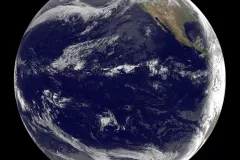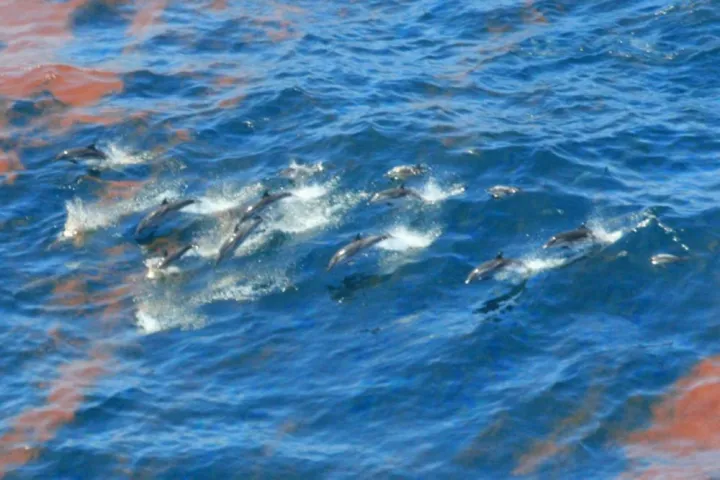Earth Day, Spawned from the Sea

Sometimes I think that our planet Earth, named for the Old English word for “dry land” (eorthe), should get a new name. Despite our knowledge that more than 70 percent of the planet’s surface is ocean—definitely not “dry land”—we still refer to our home by an 8th century description.
The same goes for Earth Day. Since 1970, people around the world have set aside April 22nd of each year to think about protecting the environment. This includes the ocean, as it’s a huge part of Earth’s environment. But the sea often seems to play a background role compared to more terrestrial causes.
What many people forget is that the inspiration for Earth Day came from the ocean. In 1969, a pipe carrying oil from 3,500 feet below the seafloor split off the coast of Santa Barbara, California, spilling some 3 million gallons of oil into the ocean over the course of 10 days—the biggest spill in U.S. history at that point, and still the third-largest. Then, as with the Gulf oil spill, the oil company responsible flubbed its initial attempts to plug up the leak, showing that they had no viable back-up plan in case of an accident, while volunteers led beach cleanups. The thick oil killed thousands of seabirds, along with dolphins, California’s iconic sea lions and elephant seals, and countless fish and invertebrates.
The whole thing was broadcast to the nation’s people, who watched in horror at the harm to the ocean and the shoreline. And thus Earth Day was born. On April 22 of the following year, 20 million Americans focused on environmental issues for a single day, inspired by the devastation off the coast of Santa Barbara. Now more than 1 billion people participate from countries around the world.
This year's Earth Day falls just two days after the 5-year anniversary of the Deepwater Horizon oil spill, which is considered the largest accidental marine oil spill in U.S. history. Five years ago today, no one knew that such a big spill was coming; the rig had just sank beneath the waves and no oil was yet visible at the surface. Within a few days, it became clear that oil was gushing from the deep-sea well at a rapid click and that there was no back-up plan to put a stop to it.
The Gulf oil spill was a terrible environmental disaster in its own right, but it also came to symbolize the widespread damage that our dependence on oil and fossil fuels was doing to the planet. Measurements tell us that atmospheric carbon dioxide levels are higher than they've been in human history and are driving global temperatures up. However, the effects of climate change on wildlife and people are slow enough that they can be hard to notice. 3.19 million barrels of oil gushing into a beautiful ecosystem is a much more obvious sign of our dependence on fossil fuels and the environmental harm in its wake.
So today, this Earth day, let's think about how each of us individually can use less oil and other fossil fuels.
- Whenever possible, travel using your body's energy by riding a bike, walking, skateboarding, or rollerblading to get around. If you need to travel farther, take public transportation or carpool to cut down on fossil fuel use per person.
- Use less energy at home by turning off electronics when you're not using them and using energy-efficient bulbs and appliances whenever possible.
- Watch your water use by taking shorter showers, turning off the faucet when you're brushing your teeth, and using cold water instead of hot.
- Buy less stuff. Making products takes fossil fuels, as does shipping those products to stores around the country. Even throwing out or recycling an objects uses fossil fuels. So buy only what you need, buy local or recycled products whenever possible, and reuse and recycle what you have.
In addition to reducing our use of energy, we must reduce our other impacts on the ocean and the atmosphere any small way we can. It will mean learning new personal habits, such as using less plastic, volunteering to plant trees or clean up outdoor areas, and working collectively as communities, nations and as a species to keep our spaceship Earth clean and healthy.
What are you going to change about your life to help the ocean? For ideas, see our long list of ways you can help the ocean or our short list: five simple ways you can help the ocean.
And don’t forget to talk about the ocean today, and tell your friends the origin story of Earth Day: just like life, it came from the sea.


